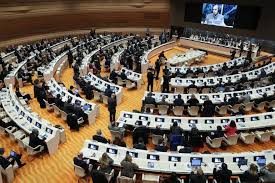
A Platform for International Cooperation
In a significant step towards addressing global humanitarian crises, Pakistan’s Foreign Ministry recently hosted a global humanitarian aid conference, bringing together policymakers, international organizations, and humanitarian experts from around the world. The conference provided a crucial platform for discussing the growing challenges faced by countries dealing with conflicts, natural disasters, and economic instability. With millions of people affected by humanitarian crises globally, the conference served as an opportunity for Pakistan to demonstrate its commitment to international solidarity and humanitarian aid, while also fostering greater cooperation among global stakeholders to address pressing issues such as poverty, displacement, and the provision of basic human rights.
Focus on Humanitarian Assistance in Conflict Zones
One of the central themes of the conference was the urgent need for humanitarian assistance in conflict zones, where millions of people are deprived of basic necessities such as food, clean water, and medical care. Pakistan has long been involved in providing aid to such regions, especially in neighboring Afghanistan and other parts of South Asia. Through this conference, Pakistan emphasized the importance of coordinated, timely, and impartial humanitarian interventions in conflict zones. Participants discussed ways to ensure that aid reaches those who need it most, even in situations where access is restricted due to ongoing hostilities. The conference highlighted the critical role of international organizations, NGOs, and local governments in navigating the complexities of providing aid in war-torn regions.
Addressing Climate Change and Displacement
Another key topic at the conference was the impact of climate change on global displacement and the subsequent humanitarian needs. As climate change leads to more frequent and severe natural disasters, millions of people are being forced to leave their homes, creating a new wave of climate refugees. Pakistan, which has experienced devastating floods and other climate-related challenges, shared its own experiences and emphasized the need for a global response to help communities adapt to the impacts of climate change. Experts at the conference discussed strategies for providing emergency relief and building resilience in vulnerable communities, while also addressing the root causes of displacement. By focusing on the nexus between climate change and humanitarian aid, the conference underscored the importance of long-term solutions to prevent further displacement and suffering.
Strengthening Humanitarian Aid Mechanisms
A key takeaway from the conference was the need to strengthen global humanitarian aid mechanisms. While aid efforts have often been reactive, the conference emphasized the importance of proactive strategies for disaster preparedness and response. This includes improving early warning systems, investing in infrastructure that can withstand natural disasters, and increasing coordination among humanitarian actors to avoid duplication of efforts. Pakistan’s role in advocating for more effective aid mechanisms was crucial, as the country has long been a recipient and provider of humanitarian assistance. By working with international partners to refine these mechanisms, Pakistan is positioning itself as a leader in advocating for more efficient and responsive aid distribution, ensuring that resources reach those in need in a timely and effective manner.
Looking Ahead: Long-Term Commitment to Humanitarian Efforts
In closing, the conference emphasized the need for long-term commitment to humanitarian efforts, particularly in light of the escalating crises facing vulnerable populations worldwide. Pakistan reiterated its dedication to continuing its humanitarian work, both within its borders and globally, by providing aid, resources, and expertise to those affected by disasters, conflicts, and climate change. By hosting this global conference, Pakistan reinforced its role as a key player in the international humanitarian community and pledged to work with global partners to ensure that no one is left behind in the pursuit of peace, security, and human dignity. The discussions and commitments made during the conference are expected to lead to tangible actions that will help mitigate future crises and ensure that vulnerable populations receive the support they need in times of need.
